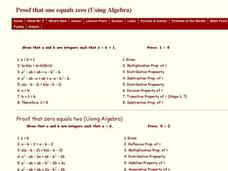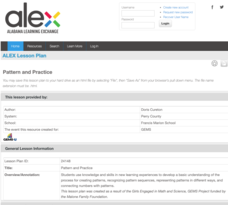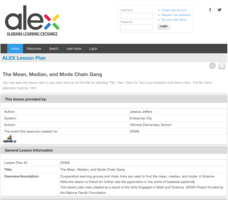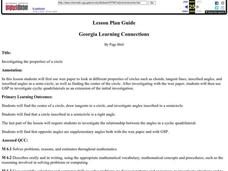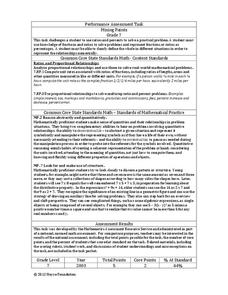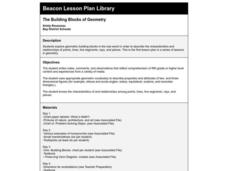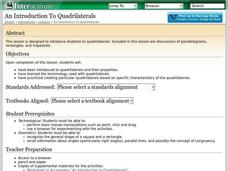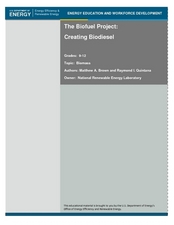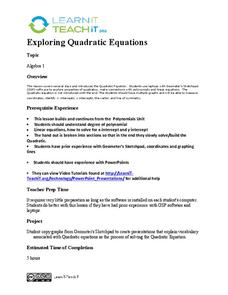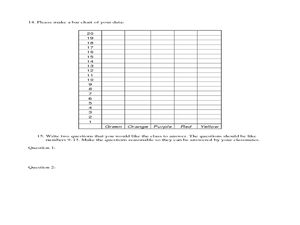Curated OER
Representing Relationships with Equations
Young scholars explore Cuisenaire Rods. In this pre-algebra lesson plan, students work with a partner to generate addition problems with the sum of ten using Cuisenaire Rods. Young scholars construct examples of the Commutative...
Curated OER
How Many More?
Students complete subtraction problems where they use goldfish crackers as their manipulatives in the problem. In this subtraction lesson plan, students use words and pictures to also show their problems.
Curated OER
Proof that One Equals Zero and Zero Equals Two
In this algebra worksheet, 11th graders complete proofs that show why properties are true. There are 2 proofs given with 8 required steps.
Curated OER
Chapter 2 Test
In this algebra worksheet, students solve fractions, identify properties of numbers and solve 1 and 2 steps linear equations. There are 25 questions.
Curated OER
Algebra Test
In this algebra worksheet, students solve problems that are rational and irrational. They rewrite fractions as decimals and show understanding of basic number properties. There are 25 questions.
Alabama Learning Exchange
Pattern and Practice
Young scholars learn how to make patterns. Students first display their prior knowledge of patterns before delving into the lesson. They complete a worksheet and participate in a web-based class activity. They work in cooperative groups...
Alabama Learning Exchange
The Mean, Median, and Mode Chain Gang
Students analyze a set of data. They work in cooperative groups and use chain links to identify the mean, median, and mode of the chain.
Curated OER
Multiplying Polynomials
Students explore the concept of multiplying polynomials. In this multiplying polynomials instructional activity, students watch a video clip about basic math skills. Students work in groups on an exploration about why a binomial squared...
Curated OER
Making Regolith
You may not be able to take a field trip to the moon, but that doesn't mean your class can't study moon rocks. Using graham crackers as the moon's bedrock and powdered donuts as micrometeorites, young scientists simulate...
Curated OER
Investigating the properties of a circle
Students use wax paper to look at different properties of circles such as chords, tangent lines, inscribed angles, and inscribed angles in a semi-circle, as well as finding the center of the circle, and use GSP to investigate cyclic...
Teach Engineering
Alloy Advantage
Mix it up by using an intriguing resource that teaches young metallurgists that alloys are a metal mixture. They learn about the advantages of using alloys over pure metals and investigate titanium alloys as an example to finish the...
Noyce Foundation
Mixing Paints
Let's paint the town equal parts yellow and violet, or simply brown. Pupils calculate the amount of blue and red paint needed to make six quarts of brown paint. Individuals then explain how they determined the percentage of the brown...
Inside Mathematics
Snakes
Get a line on the snakes. The assessment task requires the class to determine the species of unknown snakes based upon collected data. Individuals analyze two scatter plots and determine the most likely species for five...
Curated OER
Parallel and Perpendicular Lines
Tenth graders explore parallel and perpendicular lines. In this geometry lesson, 10th graders investigate the relationships associated with parallel lines and transversals, perpendicular lines, and the angles formed by these...
Curated OER
The Building Blocks of Geometry
Fifth graders explore geometric building blocks in the real world in order to describe the characteristics and relationships of points, lines, line segments, rays, and planes. This is the first lesson plan in a series of lessons in...
Curated OER
Hot shots 1
Students recognize the simple percentages equivalent to ?? or ?? etc, and their equivalent value as decimals. They work independently of the teacher to practice number properties. Answer key included.
Curated OER
An Introduction to Quadrilaterals
Students explore the concept of quadrilaterals. In this quadrilateral lesson, students play with a floor tile applet to see that there are many types and characteristics of quadrilaterals including parallelograms, trapezoids, rectangles,...
Alabama Learning Exchange
Watch That Plant Grow
Middle schoolers examine the growth of marigolds in a greenhouse environment. They chart data in spreadsheets showing plant growth over time and under a number of conditions. They record measures of plant height and greenhouse temperature.
Curated OER
The Bio-fuel Project: Creating Bio-diesel
Students investigate bio-fuel. In this investigative lesson, students create bio-fuel from vegetable oil waste. Students will analyze, predict, collect and synthesize data from their experiments with bio-fuel.
Alabama Learning Exchange
The Birth of Rock(s) - Identifying Rock Types
Young scientists investigate types of rocks in this instructional activity. They collaborate to examine groups of rocks, make written descriptions of them, and use websites to help them identify the types of rocks they are.
Curated OER
Exploring Quadratic Equations
Eleventh graders explore quadratic equations. In this Algebra II lesson plan, 11th graders use Geometer’s Sketchpad to explore the properties of quadratics and the connections with polynomials and linear equations. The lesson...
Curated OER
Nature's Polyhedrons
Students discover the characteristics of polyhedra. Through hands-on activities and interactive videos, students investigate and retrieve information on polyhedra and crystal structures. Students study angles and symmetry. They...
Curated OER
2.0 "Water Is Life" Global Water Awareness Mini-Unit (Grades3-5)
Students study the amount of potable water on the Earth. For this water lesson, students examine the amount of potable water as compared to all the water on the Earth. They discuss why many parts of the world do not have access to good...
Curated OER
Using Ratios to Taste the Rainbow
Students solve problems using ratios and proportion. For this algebra lesson, students analyze skittles and their different colors as they apply the properties of ratios and proportions to solve their problems.




